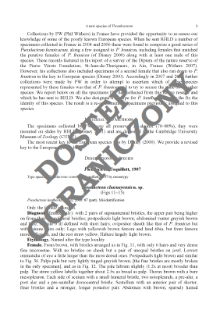
Object
Title: Diversiry of marine invertebrates with a case study of crustacean decapods and molecular phylogenetic studies in Korea
Creator:
Kim, Won (1955– ) ; Polska Akademia Nauk. Muzeum i Instytut Zoologii
Date issued/created:
Resource type:
Subtitle:
Fauna and Flora of the Korean Peninsula ; Różnorodność bezkęgowców morskich wraz z przyczynkiem do znajomości Decapoda oraz filogenetycznych badań molekularnych w Korei ; Marine invertebrates of Korea
Publisher:
Muzeum i Imstytut Zoologii Polskiej Akademii Nauk
Place of publishing:
Description:
W serii gł.: Fragmenta Faunistica, t. 40, nr 27 ; Zawiera materiały z konferencji: Polish-Korean Joint Seminar Fauna and Flora of the Korean Peninsula: Their Inventory, Systematics and Evolution in Perspective of Biodiversity Conservation ; Bibliogr. p. 303-304 ; P. 299-305 ; 24 cm ; Abstract in Polish. Taxa in Latin.
Type of object:
Abstract:
Marine invertebrates are abundant in Korean waters. However, biological researches on marine invertebrates are limited to the faunal studies in most of the taxa. About 2 800 species of the marine invertebrates (excluding Protozoa) have been reported from Korea. In crustacean decapods, one of the well known group in Korea, 83 species of shrimps (including 16 freshwater species, and infraorders Astacidea and Palinura), 187 of crabs, and 59 of anomurans (including infraorder Thalassinidea) are known. Looking at decapod biodiversity, southern form and temperate zone form are abundant and the highest species diversity is observed in the Cheju Island waters. 29 species of shrimp, 4 of anomuran, and 24 of crab are economically important and 10 species of shrimp, 19 of anomuran, and 55 of crab are considered as rare species. Molecular phylogenetic studies based on the nucleotide sequences of macromolecules are limited to some animal groups such as anthozoans, crustacean decapods, copepods, molluscans, branchiobdellidans. With the current knowledge about the marine invertebrate fauna as well as the crustacean decapods in Korea, it is difficult to discuss the various aspects of biodiversity. Therefore, the continuous collections, inventory, faunal and systematic studies including molecular approaches one very marine invertebrates are urgently in need.
Relation:
Fragmenta Faunistica ; Fragmenta Faunistica. Fauna and Flora of the Korean Peninsula
Volume:
Issue:
Start page:
End page:
Detailed Resource Type:
Format:
Resource Identifier:
oai:rcin.org.pl:54442 ; 10.3161/00159301FF1997.40.27.299
Source:
MiIZ PAN, call no. P.256, T. 40 nr 27 ; MiIZ PAN, call no. P.4664, T. 40 nr 27 ; click here to follow the link
Language:
Rights:
Rights Reserved - Restricted Access
Terms of use:
Digitizing institution:
Museum and Institute of Zoology of the Polish Academy of Sciences
Original in:
Library of the Museum and Institute of Zoology of the Polish Academy of Sciences
Projects co-financed by:
Programme Innovative Economy, 2010-2014, Priority Axis 2. R&D infrastructure ; European Union. European Regional Development Fund
Access:
Object collections:
- Digital Repository of Scientific Institutes > Partners' collections > Museum and Institute of Zoology PAS > Scientific Journals
- Digital Repository of Scientific Institutes > Partners' collections > Museum and Institute of Zoology PAS > MIZ PAN Publications > Fragmenta Faunistica
- Digital Repository of Scientific Institutes > Literature > Journals/Articles
Last modified:
Aug 2, 2024
In our library since:
Jun 22, 2015
Number of object content downloads / hits:
38
All available object's versions:
https://rcin.org.pl./publication/60929
Show description in RDF format:
Show description in RDFa format:
Show description in OAI-PMH format:
Objects Similar
Kwon, Yong Jung Huh, Eun Yeop Polska Akademia Nauk. Muzeum i Instytut Zoologii
Tomek, Teresa (1945– ) Polska Akademia Nauk. Muzeum i Instytut Zoologii
Kim, Yong-Shik Lee, Yoo-Mi Polska Akademia Nauk. Muzeum i Instytut Zoologii
Szeptycki, Andrzej (1939–2008) Polska Akademia Nauk. Muzeum i Instytut Zoologii
Weiner, Wanda Polska Akademia Nauk. Muzeum i Instytut Zoologii
Koh, Hung Sun Polska Akademia Nauk. Muzeum i Instytut Zoologii
Lee, Byung-Hoon Cho, Young Bok Lee, Eui-Hyeong Polska Akademia Nauk. Muzeum i Instytut Zoologii
Pawłowski, Jerzy Polska Akademia Nauk. Muzeum i Instytut Zoologii

 INSTYTUT ARCHEOLOGII I ETNOLOGII POLSKIEJ AKADEMII NAUK
INSTYTUT ARCHEOLOGII I ETNOLOGII POLSKIEJ AKADEMII NAUK
 INSTYTUT BADAŃ LITERACKICH POLSKIEJ AKADEMII NAUK
INSTYTUT BADAŃ LITERACKICH POLSKIEJ AKADEMII NAUK
 INSTYTUT BADAWCZY LEŚNICTWA
INSTYTUT BADAWCZY LEŚNICTWA
 INSTYTUT BIOLOGII DOŚWIADCZALNEJ IM. MARCELEGO NENCKIEGO POLSKIEJ AKADEMII NAUK
INSTYTUT BIOLOGII DOŚWIADCZALNEJ IM. MARCELEGO NENCKIEGO POLSKIEJ AKADEMII NAUK
 INSTYTUT BIOLOGII SSAKÓW POLSKIEJ AKADEMII NAUK
INSTYTUT BIOLOGII SSAKÓW POLSKIEJ AKADEMII NAUK
 INSTYTUT CHEMII FIZYCZNEJ PAN
INSTYTUT CHEMII FIZYCZNEJ PAN
 INSTYTUT CHEMII ORGANICZNEJ PAN
INSTYTUT CHEMII ORGANICZNEJ PAN
 INSTYTUT FILOZOFII I SOCJOLOGII PAN
INSTYTUT FILOZOFII I SOCJOLOGII PAN
 INSTYTUT GEOGRAFII I PRZESTRZENNEGO ZAGOSPODAROWANIA PAN
INSTYTUT GEOGRAFII I PRZESTRZENNEGO ZAGOSPODAROWANIA PAN
 INSTYTUT HISTORII im. TADEUSZA MANTEUFFLA POLSKIEJ AKADEMII NAUK
INSTYTUT HISTORII im. TADEUSZA MANTEUFFLA POLSKIEJ AKADEMII NAUK
 INSTYTUT JĘZYKA POLSKIEGO POLSKIEJ AKADEMII NAUK
INSTYTUT JĘZYKA POLSKIEGO POLSKIEJ AKADEMII NAUK
 INSTYTUT MATEMATYCZNY PAN
INSTYTUT MATEMATYCZNY PAN
 INSTYTUT MEDYCYNY DOŚWIADCZALNEJ I KLINICZNEJ IM.MIROSŁAWA MOSSAKOWSKIEGO POLSKIEJ AKADEMII NAUK
INSTYTUT MEDYCYNY DOŚWIADCZALNEJ I KLINICZNEJ IM.MIROSŁAWA MOSSAKOWSKIEGO POLSKIEJ AKADEMII NAUK
 INSTYTUT PODSTAWOWYCH PROBLEMÓW TECHNIKI PAN
INSTYTUT PODSTAWOWYCH PROBLEMÓW TECHNIKI PAN
 INSTYTUT SLAWISTYKI PAN
INSTYTUT SLAWISTYKI PAN
 SIEĆ BADAWCZA ŁUKASIEWICZ - INSTYTUT TECHNOLOGII MATERIAŁÓW ELEKTRONICZNYCH
SIEĆ BADAWCZA ŁUKASIEWICZ - INSTYTUT TECHNOLOGII MATERIAŁÓW ELEKTRONICZNYCH
 MUZEUM I INSTYTUT ZOOLOGII POLSKIEJ AKADEMII NAUK
MUZEUM I INSTYTUT ZOOLOGII POLSKIEJ AKADEMII NAUK
 INSTYTUT BADAŃ SYSTEMOWYCH PAN
INSTYTUT BADAŃ SYSTEMOWYCH PAN
 INSTYTUT BOTANIKI IM. WŁADYSŁAWA SZAFERA POLSKIEJ AKADEMII NAUK
INSTYTUT BOTANIKI IM. WŁADYSŁAWA SZAFERA POLSKIEJ AKADEMII NAUK


































